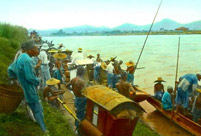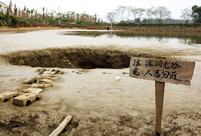

BEIJING, April 23 -- China's recovery of the Nansha Islands from Japanese occupation at the conclusion of World War II is part of the post-war international order.
During World War II, Japan invaded and illegally occupied a group of Chinese islands in the South China Sea, including the Dongsha Islands, the Xisha Islands and the Nansha Islands.
The Chinese people courageously rose in resistance against the Japanese aggression and hence safeguarded China and its territory, an indelible contribution to the triumph of the world anti-Fascist war.
In December 1943, the Cairo Declaration stated in explicit terms that "all the territories Japan has stolen from the Chinese" shall be restored to China.
In July 1945, the Potsdam Declaration reaffirmed "the terms of the Cairo Declaration shall be carried out."
In September 1945, Japan signed the Instrument of Surrender and proclaimed unconditional surrender to the allied powers which included the United States, China, Britain and the Soviet Union.
The surrender document said that the emperor, the Japanese government and their successors should "carry out the provisions of the Potsdam Declaration in good faith."
After the war ended, China took back those islands in the South China Sea.
The United Nations (UN) Charter, which came into effect in October 1947, established the principle of sovereign equality. It also stipulated that all members shall in their international relations refrain from the threat or use of force against the territorial integrity or political independence of any state, or act in any other manner inconsistent with the purposes of the United Nations.
After the 1970s, the Philippines and Vietnam illegally occupied islands and reefs that are part of China's Nansha Islands. The two countries have built fixed facilities like airports, reclaimed land and even deployed offensive weapons like missiles.
The illegal occupation violated the basic principles of the UN Charter and undermined the territorial arrangement stated in a series of crucial documents which formed the bedrock of the post-war international order.
Ever since the illegal occupation of China's Nansha Islands by the Philippines and Vietnam, the status quo in the South China Sea has changed and disputes have broken out.
China, as a party in and builder and steadfast guardian of the post-war international order, stands ready to safeguard its islands in the South China Sea and will not tolerate any more infringements on its sovereign territory.
 The evolution of J-10 fighter
The evolution of J-10 fighter Top 10 Asian beauties in 2016
Top 10 Asian beauties in 2016 What's happening in Xisha Islands?
What's happening in Xisha Islands? When female soldiers meet flowers
When female soldiers meet flowers North Sea Fleet conducts drill in West Pacific Ocean
North Sea Fleet conducts drill in West Pacific Ocean Old photos record the change of Sichuan over a century
Old photos record the change of Sichuan over a century Breathtaking aerial photos of tulip blossoms in C China
Breathtaking aerial photos of tulip blossoms in C China Horrific: Pit swallows 25 tons of fish overnight
Horrific: Pit swallows 25 tons of fish overnight Vietnamese Su-30 fighters fly over Nanwei Island in South China Sea
Vietnamese Su-30 fighters fly over Nanwei Island in South China Sea Top 20 hottest women in the world in 2014
Top 20 hottest women in the world in 2014 Top 10 hardest languages to learn
Top 10 hardest languages to learn 10 Chinese female stars with most beautiful faces
10 Chinese female stars with most beautiful faces China’s Top 10 Unique Bridges, Highways and Roads
China’s Top 10 Unique Bridges, Highways and Roads Great service or too much
Great service or too much Reality show sparks anger after endangering relics
Reality show sparks anger after endangering relics Relocated farmers not provided government services
Relocated farmers not provided government services ‘Leftover Women’ don’t want to wear stereotyped labels, even proudly
‘Leftover Women’ don’t want to wear stereotyped labels, even proudlyDay|Week